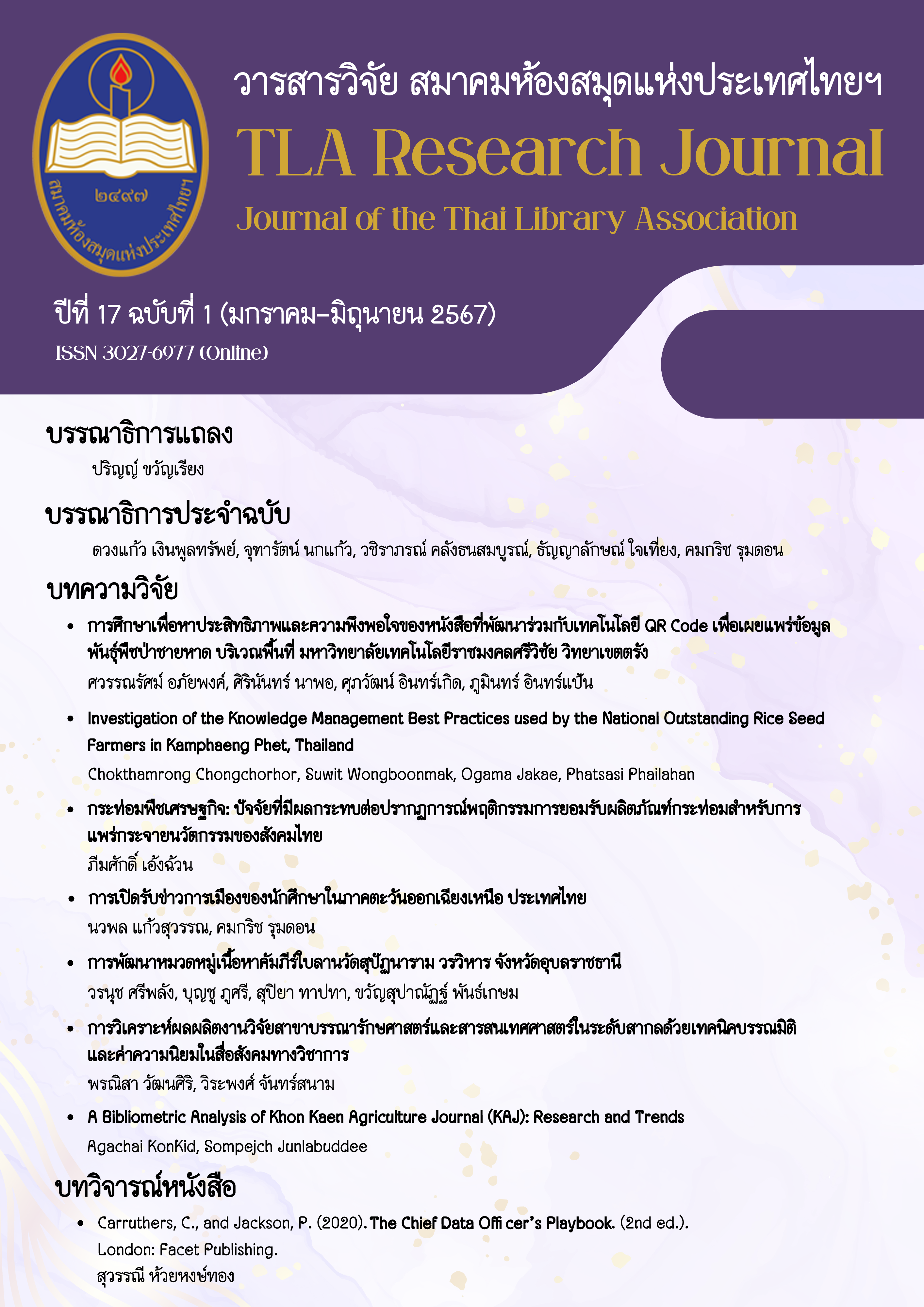Investigation of the knowledge management best practices used by the national outstanding rice seed farmers in Kamphaeng Phet, Thailand
Main Article Content
Abstract
This qualitative research examines the knowledge management practices of farmers who breed outstanding rice seeds in Kamphaeng Phet, Thailand. The study involved 12 farmers with at least 10 years of rice planting experience and who received national awards for breeding outstanding rice seeds, using the snowball sampling technique. Data collection methods included in-depth interviews, informal focus group discussions, and participant and non-participant observations. Triangulation and inductive analysis were utilized to present the results of descriptive data analysis. The research identified six steps in knowledge management practices: knowledge identification, knowledge capture, knowledge organization, knowledge evaluation, knowledge implementation, and knowledge distribution. Internal factors supporting knowledge management success included motivation to produce high-quality rice seeds locally, collaborative learning processes, and equitable profit distribution. External factors included strengthened support for knowledge promotion from the Rice Seed Centre in Kamphaeng Phet and facilitated knowledge exchange between scientific and local wisdom knowledge by the Rice Department of Thailand.
Article Details

This work is licensed under a Creative Commons Attribution-NonCommercial-NoDerivatives 4.0 International License.
บทความทุกเรื่องที่ลงตีพิมพ์จะได้รับการตรวจอ่านโดยผู้ทรงคุณวุฒิ ความคิดเห็นและบทความที่ปรากฏในวารสารนี้ เป็นของผู้เขียนซึ่งมิใช่เป็นความคิดเห็นของคณะผู้จัดทำ และมิใช่ความรับผิดชอบของสมาคมห้องสมุดแห่งประเทศไทยฯ การนำบทความในวารสารนี้ไปตีพิมพ์ซ้ำต้องได้รับอนุญาตจากคณะผู้จัดทำ
All articles submitted for publication will be reviewed by the academic reviewers. The editorial board and TLA claim no responsibility for the content or opinions expressed by the authors of individual articles or columns in this journal. Reprinting of any articles in this journal must be permitted by the editorial board.
References
Alavi, M. (1997). Knowledge management and knowledge management systems: conceptual foundations and research issues. Management Information Systems Quarterly, 25(1), 107-136.
Boonpitak, S., Meepripruk, M., Pongpinyoopat, S., Ratanopas, W., Plailaharn, S., and Chaimongkol, D. (2016). Culture traditional and local knowledge of farmer’s plant local rice in Muang and Sai Ngam districts, Kamphaeng Phet province. the Golden Teak: Humanity and Social Science Journal, 22(4): 94-104. [In Thai]
Chartbanchachai, S. (2005). Learning process: concepts, meanings and lessons in Thai society. Bangkok: Institute for Learning for Happy Community (SERC), Local Development Foundation. [In Thai]
Chinwinitkul, W. (2006). Research on learning processes in communities based on Sufficiency Economy Philosophy: A case study of Mairiang community, Chawang district, Nakhon Si Thammarat province. (Master's thesis). Social Development Program, National Institute of Development Administration. [In Thai]
Davenport, T.H. and Prusak, L. (1998). Working knowledge: How organizations manage what they know. Boston: Harvard Business School Press. Her Royal Highness Princess Maha Chakri Sirindhorn. (1995). Thai rice. Bangkok: Ministry of Commerce. [In Thai]
Jashapara, A. (2011). Knowledge management: An integrated approach. Essex: Pearson Education.
Jinawong, S. (2001). Research on analyzing the learning processes of economic activities and income distribution in communities applying sufficiency economy development approach. (Doctoral dissertation). Chulalongkorn University. [In Thai]
Kamphaeng Phet Province Agriculture Office. (2017). Basic agricultural information of Kamphaeng Phet province. Kamphaeng Phet: Agriculture Office of Kamphaeng Phet Province. [In Thai]
Khaosaard, M., Norintorn, A., Phankhiao, N., Lueth, S., Nimitt, L., Kiattikrai, N., and Phiboonrungroj, P. (2005). Evaluation of Thai intellectual property value: A case study of indigenous rice varieties. Chiang Mai: Chiang Mai University. [In Thai]
Na-Thalang, E. (2001). Indigenous knowledge of four regional communities: lifestyles and learning processes of Thai villagers. Nonthaburi: Sukhothai Thammathirat Open University. [In Thai]
Newell, S., Robertson, M., Scarbrough, H., and Swann, J. (2009). Managing knowledge work and innovation. Basingstoke: Palgrave Macmillan.
Ngamlamom, W. (2015). Participation theory. Pathum Thani: Thai Academic Institute of Management Research and Development. [In Thai]
Ngamlamom, W., and Thirasirikul, J. (2018). The evaluation of helping farmer policy in the case of the spending 1,000 baht per rai for farmers project in Surin province. The Liberal Arts journal, Mahidol University, 1(2): 83-99. [In Thai]
Nonaka, I., and Konno, N. (1998). The four characteristics of Ba in "The concept of "Ba": Building a foundation for knowledge creation. California Management Review, 40(3), 1-15.
Office of the National Economic and Social Development Council. (2023). The thirteenth National Economic and Social Development Plan (2023-2027). Bangkok: Office of the Prime Minister of Thailand. [In Thai]
Phanich, W. (2005). Knowledge management: practitioner's edition. Bangkok: Institute for Knowledge Management Promotion for Society. [In Thai]
Polthanee, A. (2010). Indigenous agricultural knowledge: A sample of practice in Northeast Thailand. International Journal of Environmental and Rural Development, 1(1), 68-73.
Satsanguan, N. (2002). Rice culture in Thai society: Persistence and change. Bangkok: Chulalongkorn University Press. [In Thai]
Tiwata, A. (2002). The knowledge management toolkit: Orchestrating It, strategy, and knowledge platforms. London: Pearson education.
Thongdee, I. (1994). Rice culture: Rituals and rice farming (2nd ed.). Nakhon Pathom: Language and Culture Research Institute for Rural Development, Mahidol University. [In Thai]
Tosakul, R., Benjasap, C., Promduang, P., Witthaporn, S., Jammee, S., and Pairipinat, S. (2005). One step at a time, one rice grain at a time: Wisdom of community knowledge management. Khon Kaen: Khon Kaen University Printing House. [In Thai]
Wangsrikoon, A. (2000). Research synthesis on community learning process for community strength: A meta-ethnographic research. Bangkok: Chulalongkorn University. [In Thai]
Wasi, P. (2005). Knowledge management: The process of human liberation towards potential, freedom, and happiness. Bangkok: Institute for the Promotion of Knowledge Management for Society of Thailand. [In Thai]
Wattanasiritham, P. (1999). The concept of community economic development. Bangkok: Edison Press Products. [In Thai]


